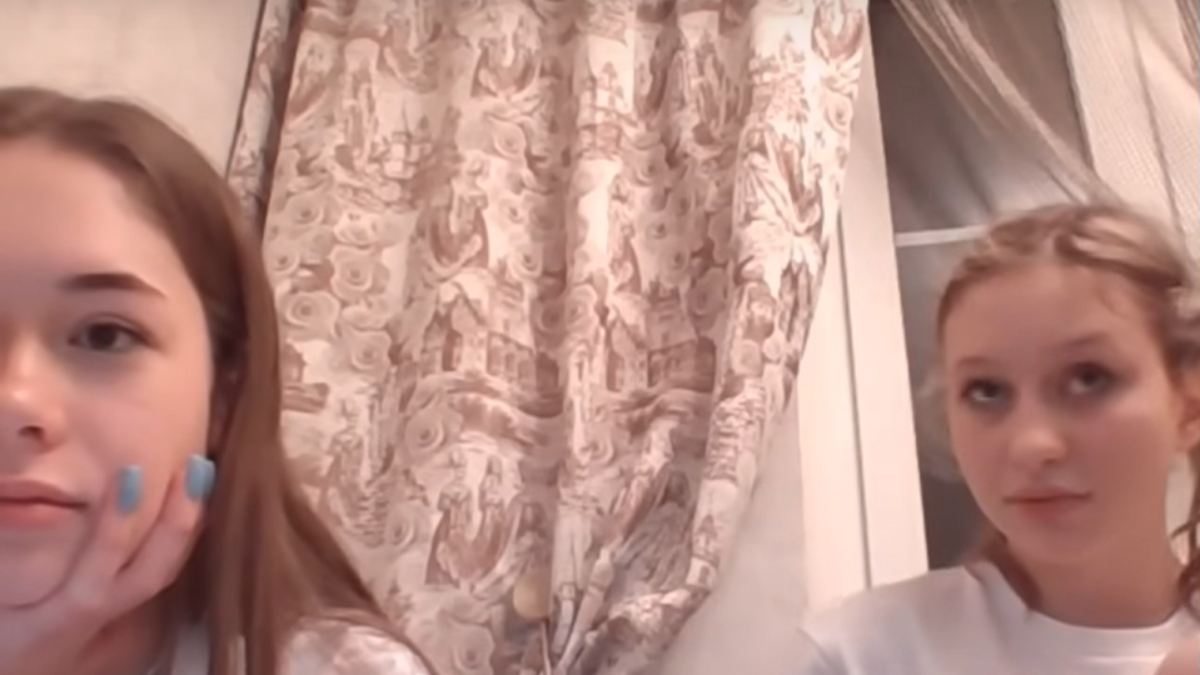Most Ukrainians find conversations with former friends and relatives in Russia pointless, and most private contacts are unused. The Chatroulette platform shows that Russians and Ukrainians live in completely different worlds.
Today there is largely a lack of speech between Ukrainians and Russians. Ukraine broke off diplomatic relations after the Russian attack, and private and friendly relations between the people of both countries are hardly possible anymore. Most Ukrainians now find conversations with friends and relatives in Russia pointless: their former neighbors are too “zombified,” and they too often distort facts or do not want to admit the crimes their country is committing in Ukraine. Not talking about politics, just trees or the weather doesn't work either. Health alone is a dangerous issue when Russians want to kill Ukrainians because they were ordered to.
But in the anonymity of the Internet, on the video platform Chatroulette, Ukrainians and Russians continue to discuss all sensitive questions with each other. With Chatroulette, you log into a virtual room with a camera and microphone, then chance or the algorithm decides who you talk to. The participants know (or should know) that the other person's conversations may be streamed live and broadcast on social networks such as YouTube.
This type of debate between Ukrainians and Russians was already popular during the first eight years of the war since 2014, but since the beginning of the Russian invasion they have become more popular and more instructive than ever. Because probably nowhere else can the Russians' attitudes towards the attack on neighboring Ukraine be studied as closely as on Chatroulette. The participants talk in a familiar environment, usually in their home, sometimes at work or in the car. This often creates a relaxed atmosphere. The conversations can also be canceled at any time.
“Why shouldn't we laugh?”
Some Russians are demonstrating here that they lack a moral authority called conscience. For example, there is a video on YouTube that shows two eighteen-year-old Russian girls who find it funny that their father is killing people in Ukraine. They sit in their kitchen in a great mood and chat with Ukrainians of the same age about their hobbies. Whatever their attitude towards the war, they find this question “incorrect” and too intimate.
“It would be incorrect to ask about the color of your underwear,” answers the Ukrainian blogger Andryj Popik. He works as a computer science teacher in the western Ukrainian city of Khmelnytskyi and wants to help people in Russia understand the absurdity of war. He would be happy if he could only save one person a day. His videos on YouTube have been viewed 46 million times since his channel launched in August 2015.
But the two Russian women don't understand why they shouldn't laugh about the fact that their father might also be killing relatives in Ukraine. They pretend to cry. “Why can't we laugh about it, do we have to cry? What can we do?”
“For example, don't laugh about it,” the Ukrainian suggests. “Maybe you should be interested in the fact that your country is shooting rockets at my country and killing peaceful people? Your father is killing people in Ukraine, and you are happily chatting and giggling with Ukrainians here?”
One of the two women is studying medicine and the other is studying finance. They both also know that a doctor should save people. But a female doctor is “not obliged to run to Ukraine and shout with her arms outstretched 'I'm learning to be a doctor!'”. And if a girl her age in Ukraine were killed by a rocket from Russia, then fate would be responsible.
“Today I saw the devil”
They believe that both sides are to blame for the war, as with any dispute. Popik clutches his head and groans. Ukrainians shoot at Ukrainians, he's heard that many times. “But if someone comes and breaks your nose? Is it your fault then?” You don't understand his question. “Why should one compare war to a nose?” Haha, funny, they're laughing again. They say they are actually still almost children. They live in Russia and therefore they are for Russia. “Soon Ukraine will be ours anyway,” predict the two supposedly apolitical girls. “And the Ukrainians will have Russian passports and then live under a peaceful sky.” Her dad has been fighting for this for more than a year. In general, their dad is a wonderful father, he doesn't just fight because of the good pay, and he wasn't recruited from prison, they explain.
Andrij Popik is obviously shocked. “I don't believe in God, but it seems to me today I saw the devil.” The two women even agree with him and call themselves “bastards”. Popik says the devil is usually portrayed as a frightening figure with a hunchback. But that is wrong, he appears to be a pretty girl who smiles sweetly. Then he imitates the voices of the two Russian women. “Hehe, my dad went to kill you.”
“Yes!” they both shout in unison and laugh. They are happy to have been seen through.
Popik, again imitating their voices, calls them “Nazis,” and they also take that as a compliment. Only when he calls her smile hellish do they switch off and their faces disappear from the screen. “We saw the quintessence of Nazism,” comments the Ukrainian. This video alone has been seen by more than 600,000 people in the past two months.
“I'm actually Ukrainian myself”
With 40 million views in two and a half years on YouTube alone, Sergei Kraianyn is also one of the most successful Ukrainian political bloggers. Many admire him for his patience, with which he calmly listens to even the most absurd opinions. In the video “The Man Went to Kill Relatives” he talks to a young Russian woman who doesn't laugh about the war, but cries. Because so many Russians have already died in Ukraine and her husband is also fighting there, she says. But she doesn't understand why her Ukrainian relatives no longer speak to her. “My roots are from there, I'm actually from there myself.” Her husband is a contract soldier, i.e. a volunteer.
Kraianyn recommends that she explain to her relatives that her husband must kill her too, because that is his service. The Russian woman is a little embarrassed. “Yes, my good fellow, feel free to make fun of me.” She didn't do anything herself. Kraianyn can't believe it. “You explain that your husband has a contract, he goes to kill relatives. Do you understand that or don't you understand that?” No, she doesn't understand that. “You're putting psychological pressure on me,” she says, ending the conversation after eight minutes.
The stars of the video blogger scene like Kraianyn and Popik are known nationwide in Ukraine. This also applies to Andrei Karpov with his “Wata Show”. The show was so popular that it was included in the Pryamiy TV channel in 2018 and played in the studio in front of an audience. However, the TV station's managers insisted that the recordings be broadcast at a slightly delayed time so that the Russians' many obscene curses could be ignored.
“Idiots!”
However, the most hated Ukrainian blogger in Russia may be Ihor Kirylenko, a former colonel in the Soviet army. Kirylenko comes from Odessa, where he once ran for mayor. He provocatively calls his YouTube channel, which has 270,000 subscribers, “Odesskaya Junta,” and he wants to use it to “fight the Kremlin propaganda.”
“What I do is not entertainment,” he explained in an interview with the Ukrainska Pravda news site. “I consider this a serious mission. While trench warfare continues in Donbass, I have consciously joined the information war.”
He used to sit playing chatroulette in his living room in Odessa; but lately he mostly speaks against a black background. At first sight, he – born in 1959 – looks like a cozy, white-haired grandfather. But thanks to his extensive historical education and his experience as a military engineer, he finds it easy to refute propaganda fairy tales. For example, when his guests say that Catherine II founded his hometown of Odessa 230 years ago, he points out that his house is 300 years old and was therefore built before the Tsarina was born. If someone tells him that Ukraine never existed and that Lenin invented it, as Russian President Putin also claims, Kirylenko replies: “Idiots! Even in the Russian Empire, the 'Ukrainian Journal' was published in Kharkiv in 1824.”
At Chatrouelette you often get horrifying insights into the supposedly soulful “Russian soul”. For example, a man from Barnaul in Siberia claims in an interview with the Ukrainian blogger Vira Stream that the Russians did not destroy Ukrainian buildings in Ukraine, but Soviet ones. And since Russia was the legal successor of the Soviet Union, it could destroy “its” property in Ukraine.
For all its confrontation, Chatroulette is ultimately also a social laboratory, a testing ground for the chances of diplomacy. It is difficult for politicians to reach agreement when the people of both countries hold opposing views on all important issues, despise or even hate each other. Of course, what Russians say on Chatroulette is always just a snapshot. But the assertion often heard in the West that one cannot know what the Russians really think because they cannot express themselves freely in their country seems too simplistic given knowledge of these conversations. All you have to do is know Russian and listen to the people from Russia and you'll understand why so many of them support the war. It's not just Putin's war.




